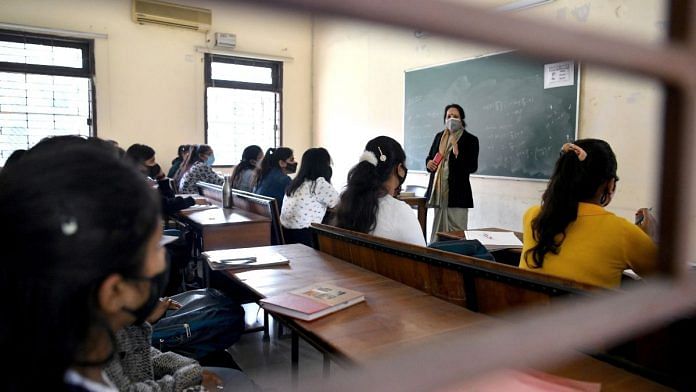New Delhi: The University Grants Commission has cleared the course structure for the four-year undergraduate programme (FYUP) proposed in the National Education Policy.
Vice-chancellors of central universities met on 10 March to approve the course, ThePrint has learnt.
The document provides a roadmap on which universities can design the FYUP. So far, Delhi University has adopted the new format from the academic year 2022-23.
The Ministry of Education has indicated it would want all central universities to adopt the programme, which will be divided into eight semesters lasting 90 days each, the document reads.
In semesters 1, 2 and 3, the student will study subjects from humanities, social sciences, mathematics, and vocational education. At the end of semester 3, the student will decide her major and minor subject for the degree, which will be allotted on the basis of interest and academic performance.
In semesters 7 and 8, the student will conduct a research-based study on the subject of specialisation.
With multiple entry-exit options, students who wish to exit after the first year will get a certificate, those exiting after two years will receive a diploma, students who complete three years will be given a bachelor’s degree and those who study four years will get a bachelor’s degree with honours.
The document also stated there would be no hard separations between ‘arts’ and ‘sciences’, between ‘curricular’ and ‘extracurricular’ activities, between ‘vocational’ and ‘academic streams’, etc. A multi-disciplinarity and a holistic approach to education across the sciences, social sciences, arts, humanities, and sports will be adopted.
Also read: UGC revises rules for PhD admission, 40% seats to be filled in entrance test apart from NET/JRF
Credit-based courses
The programmes of study would include taught courses, seminars, practicals, internships, lab work, studio activities, workshops, field projects, community engagement, a hybrid mix of taught course and field work, and an additional four credit courses involving 50 per cent credit allocation to practicals.
The course work during the first three semesters of the FYUP will consist of language education (regional and English), understanding India, environmental science/education, digital and technological solutions, mathematical and computational thinking and analysis, health & wellness, yoga education, and sports and fitness, which will be common for all students.
Course requirements of ‘majors’ offered would be 48 credit-hours. Students will have the option to choose two disciplinary/interdisciplinary ‘minors’ of 16 credit-hours each, making it a total of 32 credits.
Students will have to complete a total of 160 credit-hours in order to finish the four-year programme.
Courses based on level of difficulty
Courses in the FYUP are structured in the form of codes, which are segregated based on the learning outcomes, level of difficulty and academic rigour.
Courses in the 0-99 code will be pre-requisite courses or those with no credits. Students will have to clear these courses in order to move ahead in their programme. These will include basic courses which prepare the students for the advanced subjects that will be taught to them in the future. This will include courses like English and other languages, mathematics, history and environment education. These will be the courses studied by semester 1 students.
100-199 will include foundational courses that will make students gain basic knowledge of subjects and help them decide the subject or discipline of interest. These courses may also be prerequisites for courses in the ‘major’ subject. These courses will equip the student with the basic theories, concepts and principles in subjects that they wish to major in.
200-299 will include intermediate-level courses including subject-specific courses intended to meet the credit requirements for ‘minor’ or ‘major’ areas of learning. These courses can be prerequisite courses for advanced level major courses.
300-399 will have higher-level courses which are required for majoring in a disciplinary/interdisciplinary area of study for a degree.
400-499 will include advanced courses which will be taught through practicals, field work, research etc.
500-599 will include courses at first-year Master’s degree level for the 2-year Master’s degree programme.
Code 600-699 will be courses for the second year of a 2-year Master’s or 1-year Master’s degree programme, while 700-799 and above will include courses for doctoral students.
Also read: Delhi University to allow former students a chance to complete their final exams, obtain degrees



